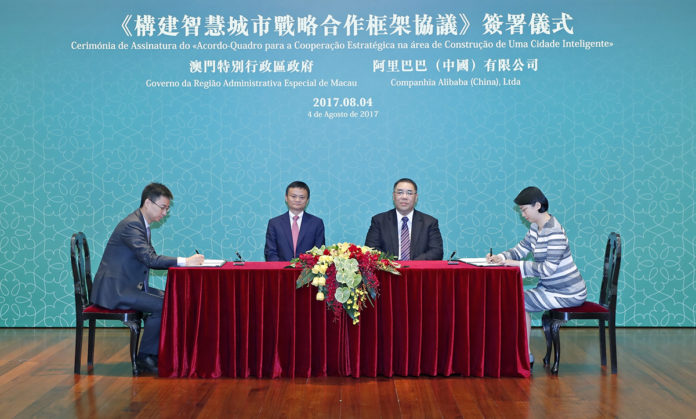The Alibaba Group signed a Framework Agreement for Strategic Cooperation in the Area of Building an Intelligent City with the MSAR authorities on Friday, with a deadline being set to fulfill the project in two phases by 2021.
In an event attended by Alibaba’s Executive Chairman, Jack Ma, the MSAR Chief Executive, Fernando Chui Sai On, and most of the city’s chief government representatives, it was announced that the first phase of the project’s implementation would be completed by June of 2019, with the second phase to be completed by June of 2021.
With the group’s subsidiary Alibaba Cloud to lead the project, the agreement expects to establish a cloud computing centre and promote Big Data usage in Macau, in order increase efficiency and further improve the city’s tourism, transportation, health care, governance and talent development.
“The data will be stored in Macau. We will build an autonomous smart city platform connected with other platforms from us or the rest of the world,” the Alibaba Cloud President, Hu Xiaoming, said on Friday.
According to information provided, Alibaba Cloud is a cloud computing company with 2.3 million customers worldwide – including 874,000 paying customers. The company’s revenues rose by 121 per cent annually to RMB6.66 billion (MOP7.98 billion/US$991.1 million) in the fiscal year ended March 31 of this year.
“Alibaba Cloud is the largest cloud service provider in mainland China and it has services spread out in more than 200 countries and regions,” according to the Chief of Office of the Chief Executive, O Lam.
The CE Chief of Office also stated that the system would not replace, but complement the already existing information technology infrastructure in Macau, with Alibaba Cloud system described as “allowing a high degree of compatibility”.
Step by step
The first phase of the project’s implementation will involve the development of the first section of the cloud computing centre, with its applications in data analysis used to improve the city tourism, qualified personnel training, traffic management, health care services, urban management and financial technology.
According to the Alibaba representatives “positive results and applications” are expected to already be seen by 2018.
The second phase is expected to see the conclusion of the computing centre development, with focus directed to environmental protection and financial predictions.
“We’re confident to create a new structure for the development of Macau, constructing a modern platform and injecting new development forces in the city,” Ms. O added.
As an example of positive applications, the Alibaba Cloud representatives described how camera footage data from the city’s main intersections could be analysed by an intelligent network to better distribute the city’s traffic lights.
Alibaba Cloud’s President described how in Hangzhou the implementation of an “urban brain” allowed adjustments to the city’s traffic lights, improving vehicle circulation speed by “between 3 to 11 per cent”.
Data with privacy
When questioned about security concerns for the cloud computing system to be developed, the Legal Affairs Bureau’s (DSAJ) Service Director, Liu Dexue said creating a cloud computing system would “imply sensible issues like interconnection, data transfer and security of databases”.
The official stated that the newly enacted Data Protection Law was “sufficient but that it could be “reinforced” through some “legislative improvements”.
According to Mr. Xiaoming, the cloud computing centre to be set up in the MSAR would follow standards set by the European Union and the United Nations.
The Alibaba Cloud President also added that local Macau residents would receive qualified training on issues such as Artificial Intelligence, IT, e-commerce and entrepreneurship.
“We will cooperate with local education institutions and support young entrepreneurship. We want young Macau people to be entrepreneurs,” Mr. Xiaoming added.
























